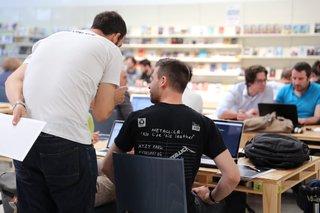Hosting a public Coderetreat is obviously more work for the organiser, adding promotion of the event and handling registration. There are several reasons why companies host a Coderetreat. I ran a public Coderetreat in Venice sponsored by Interlogica. The people of Interlogica were passionate about our craft and wanted to connect with like minded individuals. Three out of four attendees were not connected with Interlogica at all and the exchange of ideas and networking was great.
Sponsoring a Coderetreat is Awesome!
The hosting company is usually also the Coderetreat's main sponsor. Sponsoring a public Coderetreat is a marketing activity. Interlogica wanted to increase its visibility. While we cannot expect a huge impact from a single event, it definitely was a good start. I supported them because a Coderetreat is real value provided to participants and the Craftsmanship community. As the event was free for the participants, someone had to pay for the room, lunch, time spent on organisation, my (facilitator) travel expenses and so on.
 The sponsor deserves our gratitude and at least some "link love". The host and facilitator may create more buzz on Twitter and other channels, depending on the free time the host has during the sessions. I post at least some images of the sessions and retrospectives, drawing some attention to the sponsor as well. As sponsored event, this is part of the deal.
The sponsor deserves our gratitude and at least some "link love". The host and facilitator may create more buzz on Twitter and other channels, depending on the free time the host has during the sessions. I post at least some images of the sessions and retrospectives, drawing some attention to the sponsor as well. As sponsored event, this is part of the deal.Finding Local Talent
Many companies have trouble finding developers to hire. Hosting a public Coderetreat is a great way to present the company. Sometimes a representative of the sponsor will open the Coderetreat and make participants aware of open positions. I recommend distributing handouts of vacancies in the room and on the tables.
Public Coderetreats are run on Saturdays to allow people to participate. Starting Saturday morning attracts only the most passionate developers, who want to learn and engage in deliberate practice. These are exactly the kind of developers companies want to hire. A lady from Interlogica's marketing department told me that "people who understand (the idea of Coderetreat) and come are the people we want to hire."
Community and Networking
The Software Craftsmanship community is growing and a Coderetreat is also a networking event. After a few Coderetreats the participants get to know one another. For me a Coderetreat is like a class reunion, I usually know at least half of the participants and some of them are dear friends whom I would like to meet more often. For beginners or people new in the city it is a great way to get in touch with local craftsmen.
A Coderetreat ends with drinking beer in a local pub in the evening. This is another opportunity to talk to fellow software professionals. At the Coderetreat in Venice, the sponsor set up a small reception including cheese, wine and finger food for all participants. (Did I mention that they rock ;-) Interlogica's CEO was amazed by the number of different people he met and talked to during that time.
Free for Participants
According to Corey Haines, one early proponent of the Coderetreat format, the event must be free of charge for participants. Many organisers ask people only for a safety deposit of ten to 15 Euro. The deposit is refunded as soon as the person shows up and is used to pay beer in the evening if the person does not. I strongly recommend using such a safety deposit to make sure that people show up. Most organisers use Eventbrite for handling the registration, because it does not take any fee when a ticket is refunded. An Eventbrite registration page might look like the one I used for GDCR14.
Promoting the Event
After setting up Eventbrite, every public Coderetreat should be registered at coderetreat.org and promoted through Twitter, Facebook and other channels. Coderetreats in large cities, e.g. Berlin or London are sold out in under a week. In smaller communities we need to allow enough time for people to get spread the word that a Coderetreat is coming up. I recommend having the registration ready at least one month in advance to have enough time for sharing and advertising the event.
Whenever I run a Coderetreat, I talk directly to local programming language user group leaders and ask for their support to promote it. Even if I do not know these group leaders, their members might be interested in coding activities. As a Coderetreat is open to any programming language, it is much more fun to have participants from various programming backgrounds. Collaborating with user groups ensures that there are participants offering more interesting languages like Go, Elexir, Haskell, Dart and so on.
 The same is true for women in technology. For a Coderetreat in Berlin last year, one facilitators got in touch with several local women-only programming groups, like Rails Girls or PyLadies, told them about the event and opened private registration for them. He waited for a week before making the registration public. After public registration started, the event was sold out in a week.
The same is true for women in technology. For a Coderetreat in Berlin last year, one facilitators got in touch with several local women-only programming groups, like Rails Girls or PyLadies, told them about the event and opened private registration for them. He waited for a week before making the registration public. After public registration started, the event was sold out in a week.Being Awesome!
So if your company wants to be seen to care for craftsmanship, dedication and quality, you are looking for great developers to hire or you just want to work in an awesome company, hosting a Coderetreat is the right things to do. Even when you are not able to host a full Coderetreat, buying food for participants or covering expenses is appreciated.








No comments:
Post a Comment